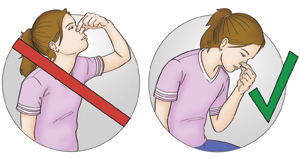Nosebleed (Adult)

Bleeding from the nose most commonly occurs because of injury or drying and cracking of the inner lining of the nose. It can happen because of dry air or nose-picking. It also can occur because of a cold or allergies, or on a very hot day or from dry air in the winter.
Most nosebleeds are not serious and happen toward the front of the nose. Nosebleeds toward the back of the nose, closer to the throat, are less common. But they may be harder to control and become more serious.
When bleeding is not able to be controlled, the site of the bleeding may be cauterized. This means it's treated to cause a blood clot to form. This may be done with a chemical, heat, or electricity. If the bleeding continues after the site is cauterized, or if the site can't be found, packing may be put in your nose. This is to apply pressure and stop the bleeding. The packing may be made of gauze or sponge.
A small balloon catheter is sometimes used. These must be removed by your health care provider. Some types of packing dissolve on their own. In rare cases, surgery or embolization (sealing of the blood vessels in the nose using a catheter through an artery) is needed to stop a nosebleed. If you are taking blood thinning (anticoagulant) medicine, you may have a blood test and be advised to stop taking certain medicines for a while.
In some cases, swallowed blood may pass through your stomach and intestines and make your bowel movements look black and tarry. If you have a blood disorder, stomach problems, intestinal disorders, or a bleeding disorder, alert your provider right away if you pass dark, tarry stools.
Home care
-
If packing was put in your nose, unless told otherwise, don't pull on it or try to remove it yourself. You will be given an appointment to have it removed. You may also have been given antibiotics to prevent a sinus infection. If so, finish all of the medicine.
-
Don't blow your nose for 12 hours after the bleeding stops. This will allow a strong blood clot to form. After that, if you have to blow your nose, do it very gently. Don't pick your nose. This may restart bleeding.
-
Don't drink alcohol or hot liquids for the next 2 days. Alcohol or hot liquids in your mouth can dilate blood vessels in your nose. This can cause bleeding to start again.
-
Don't take ibuprofen, naproxen, or medicines that contain aspirin. These thin the blood and may cause your nose to bleed. You may take acetaminophen for pain, unless another pain medicine was prescribed. Talk with your health care provider before using acetaminophen if you have chronic liver disease.
-
If the bleeding starts again, sit up and lean forward to prevent swallowing blood. Pinch your nose tightly on both sides, as shown above, for 10 to 15 minutes. Time yourself. Don’t release the pressure on your nose until at least 10 minutes is up. If bleeding doesn't stop, continue to pinch your nose and, if the bleeding is a small amount, call your provider. If bleeding is heavy, call 911 or return to this facility.
-
If you have a cold, allergies, or dry nasal membranes, lubricate the nasal passages. Gently apply a small amount of petroleum jelly inside the nose with a cotton swab twice a day (morning and night).
-
Don't overheat your home. This can dry the air and make your condition worse.
-
Put a humidifier in the room where you sleep. This will add moisture to the air. Clean the humidifier as advised by the manufacturer.
-
Use a saline nasal spray to keep nasal passages moist.
-
Don't pick your nose. Keep fingernails trimmed to decrease risk of bleeds.
-
Don't smoke.
Follow-up care
Follow up with your health care provider as advised. Nasal packing should be rechecked or removed within 2 to 3 days.
When to get medical advice
Contact your health care provider right away if you have:
-
Frequent, small amounts of bleeding that you can control for a while.
-
A fever of 100.4ºF (38ºC) or higher, or as directed by your provider.
-
A headache.
-
Sinus or facial pain.
Call 911
Call 911 or get medical care right away if you:
-
Feel dizzy or weak, or you faint.
-
Are short of breath or have trouble breathing.
-
Have another nosebleed that you can't control or have one with heavy bleeding.
-
Are abnormally tired or confused.